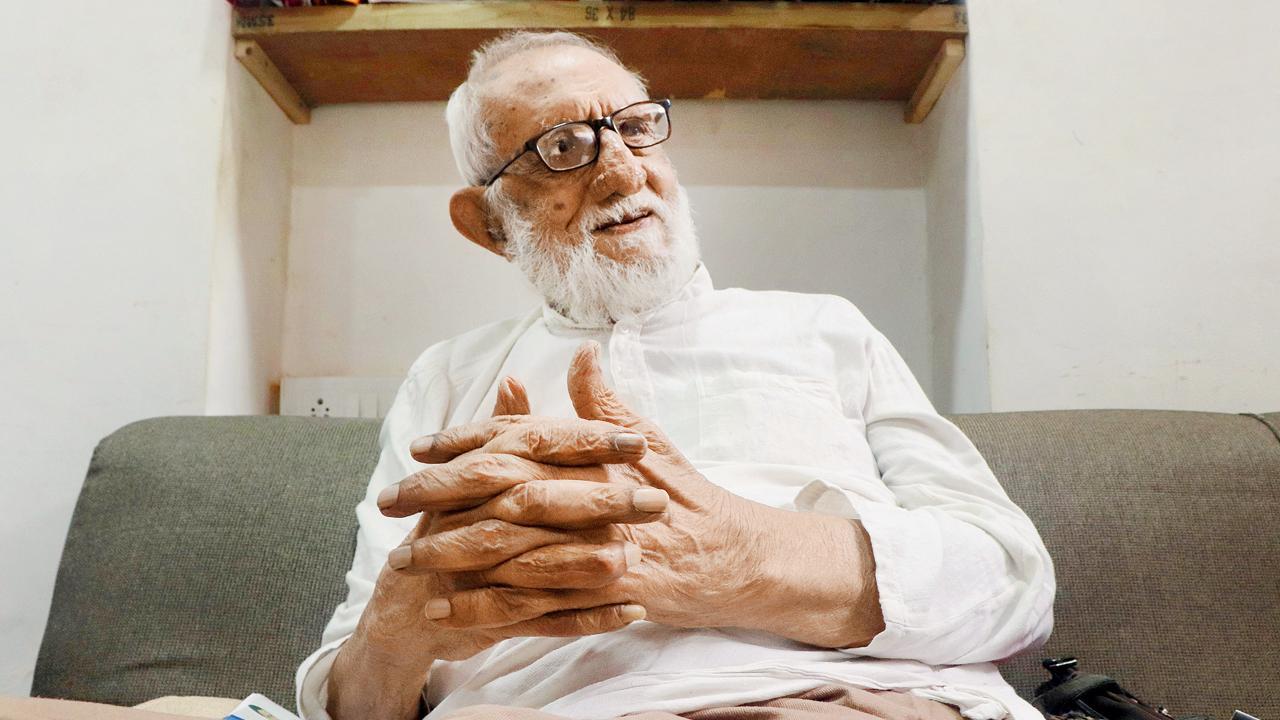Days after he turned 100, a veteran freedom fighter recounts witnessing a new India develop in front of his eyes while insisting that he is no hero

100-year-old GG Parikh has earned the ire of the British Raj, the Indira Gandhi regime and the current government in a single lifetime. Pic/Anurag Ahire
History, they say, has a way of repeating itself. When Mazgaon resident Gunvantrai Ganpatlal Parikh was issued a notice preventing him from going to the August Kranti Maidan on the anniversary of the Quit India movement in August last year, it was history repeating itself for the third time.
ADVERTISEMENT
Parikh, or GG Uncle, as he is fondly called by his doting band of young assistants, was 18 years old when he was first arrested by the British police in 1942. In December last year, Parikh celebrated his 100th birthday, and behind his slim physique lies a brain that is still as sharp as ever.
“A meeting of the All India Congress Committee was held at the August Kranti Maidan, which was then known as the Gowalia Tank on August 7 and 8, and on the 9th, Kasturba Gandhi was supposed to unfurl the Indian tricolour. But she was arrested the same morning, and Aruna Asaf Ali did the honours instead. The atmosphere was still tense and she immediately left to go underground,” the staunch Gandhian, who still dresses in khadi, tells mid-day.
That was the first time, he goes on to recount, that tear gas shells were used on protestors in Bombay.
“It was also the time we learned how to deal with them,” he says, smiling. “We learned that wiping our eyes with a wet cloth helped. It was drizzling that day and many of us held our hankies out to wet them. Others caught the shells before they hit the ground and threw them back at the police.”’
Parikh was, at the time, a student at the St Xavier’s College in south Mumbai. For the next two days, he organised pickets, and on the 12th, he led a group of young men to the Churchgate railway station, intending to stage rail rokos. He was, however, arrested at the station, taken to what was then known as the Esplanade police station, and then to a temporary prison in Worli, specially created by the government for political prisoners. He spent ten months behind bars, some of them in the Thane Central Jail. Ultimately, Parikh and other young prisoners were released, on the grounds that they were students and had been imprisoned for long enough.
“I was prepared for jail long before I was arrested,” he recalls. “It was part of our training. We would always sleep on the ground as practice. And we would fast a lot, so that the absence of meals in prison wouldn’t affect us. Frankly, we had heard a lot about people dying in jail and hence, when we’d say we were preparing for jail, we were actually preparing to die.”
It sounds quite dark when he says it in 2024, but in those days, it was a reality that everyone involved in the freedom struggle lived with.
“I don’t think I’m any kind of hero,” he says. “Elders in my family were actively involved in the freedom struggle. I attended Mahatma Gandhi’s meetings since I was eight years old, and was personally blessed by him at the age of ten. By the time I went to jail, I was a socialist but was also shedding Marxist principles to embrace the Gandhian school of thought.”
Parikh’s first disappointment came soon after India’s independence, because he believed that the new rulers would be the servants of the people. By the time Indira Gandhi imposed the Emergency, Parikh, with his staunch and vocal support for the theory that the government should put the people first, had become a target.
In October 1975, he was arrested and spent several months in jail, the only charge against him being that he knew former Samata Party leader George Fernandes.
“I always knew I was going to be arrested,” he says. “I even predicted the exact day that it would happen, correctly.”
Ask him about the current scenario and he becomes pensive.
“You know, even the British showed streaks of humanity. When Mahatma Gandhi started living in Sevagram, it was the British who provided a telephone line. Indira Gandhi, for all that she did to protect her gaddi, still had some scruples. I don’t see that in India anymore. Anyone who comes in the way of the government’s agenda is mowed down mercilessly,” he says.
In August last year, Parikh, along with Gandhi’s grandson, Tushar, and others had planned a silent march to the August Kranti Maidan to commemorate the Quit India movement. He was, however, served a notice by the Mumbai Police, forbidding him from doing so, while the others were detained. The reason: Maharashtra Chief Minister Eknath Shinde and Deputy Chief Ministers Devendra Fadnavis and Ajit Pawar were having a function of their own at the Maidan.
 Subscribe today by clicking the link and stay updated with the latest news!" Click here!
Subscribe today by clicking the link and stay updated with the latest news!" Click here!







